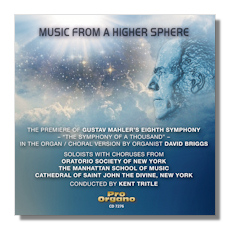
The Internet's Premier Classical Music Source
Related Links
- Mahler Reviews
- Latest Reviews
- More Reviews
-
By Composer
-
Collections
DVD & Blu-ray
Books
Concert Reviews
Articles/Interviews
Software
Audio
Search Amazon
Recommended Links
Site News
 CD Review
CD Review
Gustav Mahler

Symphony #8 "Symphony of a Thousand" (arr. David Briggs)
David Briggs, organ
Rachel Rosales, Bryn Holdsworth & Jana McIntyre, sopranos
Sara Murphy & Noragh Devlin, mezzo-sopranos
John Tiranno, tenor
Tim Murray, baritone
Adam Lau, bass
The Oratorio Society of New York/Kent Tritle
The Manhattan School of Music Symphonic and Women's Choruses/Kent Tritle
The Cathedral Choristers of St. John the Divine/Kent Tritle
Priory Records Pro Organo 7276 2CDs
This was a bad idea, and turns out to be a vanity project for organist David Briggs. Despite an undisputed reign as the "King of Instruments", the pipe organ has limitations, and Briggs ignores nearly all of them. From the cheesy title "Music from a Higher Sphere", to a near-reluctance to credit Mahler himself, the whole affair has problems before one even opens the box. Despite heroic choral singing (I'll explain later) and truly excellent organ playing from Briggs, this is a mess.
As someone who once sang in the vast space of the still unfinished monstrosity that is the Cathedral of St. John the Divine in New York City, it's obvious that the space was designed for the great anthems and chorales of the Anglican/Episcopalian traditions. That immediately rules out Mahler's Eighth, because despite Part One being based on a hymn tune, it's a mercilessly difficult piece to hold together even in the most favorable of acoustics. Like nearly all of Mahler, it is a symphony first, and not some kind of quasi-oratorio. Part Two, it might be argued, is almost operatic in nature, but requires just as much – if not more – understanding of how to cogently balance the symphonic nature of the work with the singing.
Essentially, this dooms Briggs' considerable accomplishments from the opening pages. The singing is slow, swamped by the acoustic, and dynamically limited. What we can hear is generally quite beautiful, but given the space it's nearly impossible to heed Mahler's careful instructions. Remember Michael Murray's Telarc organ recital from this church? Sure, it sounded awesome (thanks, Telarc), but the tempos were slow and the delay was slower. Imagine what this does to the composer's most epic score! Now, Georg Solti (on Decca, with full orchestra) proved that you can ignore some of those details and colors for sheer excitement, but that doesn't work here. The climaxes of Part One are masterfully played by Briggs, but are almost entirely lacking in impact. The structure of the choral parts turns choppy and feels forced. As the sound increases, the mushy ambiance swallows everything – though not the soloists somehow, who sound mighty uncomfortable at some of these tempos – and the overall picture is dull.
As you might expect – and the same is true with conductors and orchestras more comfortable with strict rhythms – Part One is at least more successful than Part Two. However, the problems reverse themselves. Here, the organ and chorus are mostly fine, but the music itself is sapped of all the hues and shades that it requires. For all his technical wizardry, David Briggs can't make an organ, well, not an organ. Credit him for some distinctive and sensitive playing, and when there's no singing, he's certainly freer to explore his ideas more fully. Unfortunately, there's a lot of singing in Part Two. Also, the soloists – while good – aren't quite the world-class voices the work requires. Yes, there are some awfully pretty and admirably blended choral sections, but the organ lacks the ability to make this music come alive. Briggs is a marvelous organist, and though his claim that the closing pages are more impactful on his instrument is essentially nonsense, he makes the best case he can.
Finally, Kent Tritle conducts like a choral conductor, which is to say that Mahler is probably not what he went to school for. He has huge forces and they sing well. They lack the intensity of the best Mahler recordings, but this was never going to be part of that conversation anyways. This is a curio, hideously packaged and recorded live before what sounds like a very small audience. I expect that the audience for this disc is even smaller.
Copyright © 2017, Brian Wigman


















